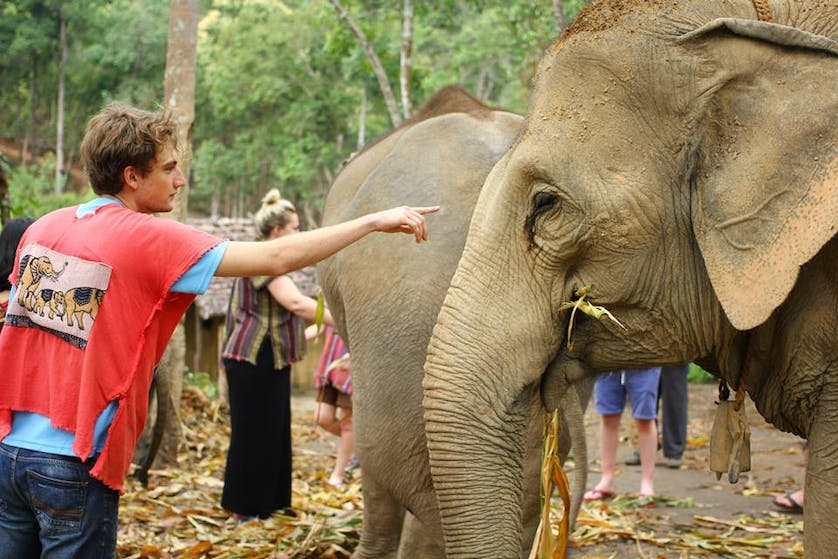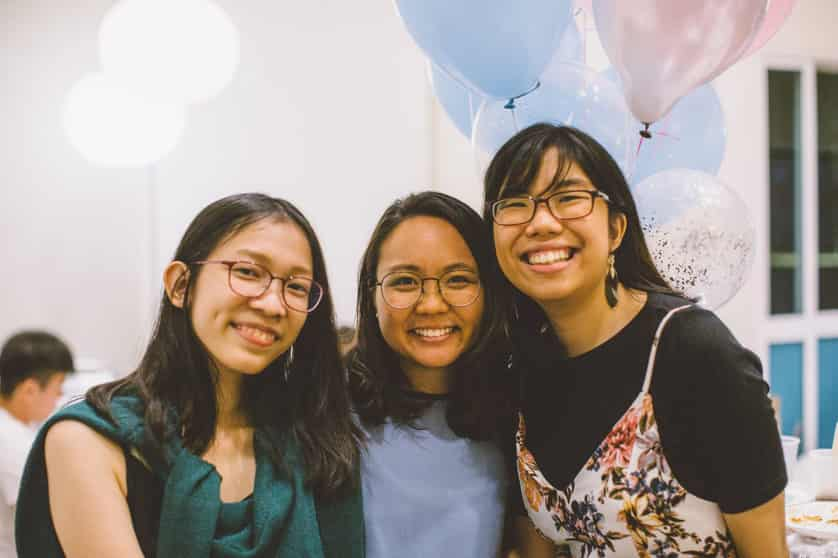Thai, American, Swedish, Indian, Portuguese – these are all nationalities, something which most Third Culture Kids aren’t comfortable labeling themselves with. As a Filipino-born citizen who spent the first 18 years of my life in Thailand, the Third Culture Kid (TCK) phenomenon is something I’m familiar with. Third Culture Kids are those who have grown up outside their parent’s culture for a significant portion of their formative years. Having lived in Chiang Mai, Thailand since I was only an infant, I’ve grown to absorb the Thai language and culture – I can even proudly say that I speak in a well-enunciated Thai accent – often times misleading people into thinking that I’m a Thai person seconds into the conversation. While living in Thailand, I attended Chiang Mai International School, which instilled in me an international perspective as well as an American accent. As a result of my inherited “Thainess” and global mindset, I’ve become ignorant of my Filipino heritage. “You’re not a real Filipino,” my parents would jokingly say to me. Although intended as a harmless comment, it always bothered me more than it should, maybe because it’s the truth – I’m not a real Filipino. How can I be when I never got to experience life there? And whenever I do go visit my homeland, I end up feeling foreign; out of place in the midst of fellow Filipinos.
Many, if not most TCKs eventually leave Thailand for good – with occasional holiday visits here and there to satisfy one’s cravings of authentic Thai food and the nostalgic setting. But leaving Thailand isn’t easy. After years and years of being molded in the customs and lifestyle of Thailand, it’s inevitable for the everyday experiences of us TCKs to be Thai. Being immersed in the sabai sabai ambience, the high-context culture and wai-ing every person you know are just a few of the unique things that we become accustomed to; things that make us anxious to leave Thailand, the place closest to our concept of home, for another country. Believe it or not, it’s often easier for a TCK to move to a foreign country than it is to move back to their homeland. And that’s because whenever a TCK moves back to their passport country, everyone back home expects them to think and act just like the average folk.
When I started jotting down ideas for this article, I realized that writing about my third culture kid challenges alone was not enough to represent the intricate thoughts and experiences of a group. So I reached out to other TCKs who have spent a great deal of their lives in Thailand and asked them to share their experiences with culture shock or reverse culture shock when moving back into their homeland.
Julie McRady, 48, USA

“I moved to Chiang Mai in 1979 at the age of eight. I returned to the States at the age of 15, oblivious to the fact that my clothing choices were odd, I knew nothing about the music, movies or pop culture of the US, and the bustle and noise of the US was so different and seemingly loud that I felt overwhelmed. That year, I began a three year process of losing myself. I became quiet and shy, which I had not been before. I felt misunderstood. That year I was required to take drivers ed., which turned out to be a disaster. The drivers ed teacher yelled at me, which I had never experienced from any adult before. That never happened in Thailand—one never raises one’s voice. Also, at one point in the year, the teacher told me to pull into the gas station and put gas in the car. I had never done this before, since in Thailand we got around on motorcycles or public transportation most of the time, and drivers never pumped their own gas in Thailand. So, when my teacher told me to get out and put gas in the car, I was at a loss. I got out and fumbled around until my teacher barked, “It’s like you have never done this before!” in complete disgust.
I felt that Americans were wasteful, excessive, and ethnocentric. I continued to feel frustrated by the ethnocentrism and ignorance about other cultures and countries throughout my college time, but eventually learned to appreciate the beauty of land and people around me. I came to realize that although experiences are different, people are people all over the world. I was excited to return to Chiang Mai after college—it was home, and where I’d spent a total of 28 years.
After moving back to the States in 2015, it was now my turn to help my own children through the process of culture shock. It was challenging for my children because they stayed in Chiang Mai, never really experiencing the thrill of going to another country to live, but instead, always being left behind by friends. They felt abandoned often. On the other hand, at this point, as teenagers, they appreciate their unique TCK label. They see that their perspective on world issues is broad. They embrace diversity. Sure, they often feel somewhat isolated and different from other people around them, now that they live in the States, but they are proud of their background. We miss the temple sounds, fresh markets, street food, and warmth of Thailand, but we are learning to love the clean air, small quiet town, and bigness of this world here.”

Dennis Leutwiler, 21, Switzerland
“Growing up in Chiang Mai, Thailand since I was 4 years old in 2002 until 2016 with no more than 5 international travels had a profound impact on the way I perceive and interact with people; in my own culture and in foreign cultures. I reached my late teens without ever leaving Thailand, save for 2 very short visa runs to Singapore and Malaysia. Prior to reaching my teens I was unable to comprehend that there was a culture of people who spoke my native language, looked like me or exhibited any behaviors I thought made me special. I always felt privileged and special living in Thailand; I always felt Thais were naturally excited to speak to me, marvel that I was from Switzerland: “Very beautiful! Very beautiful!” or the more common: “Very beautiful! Very expensive!” were frequent interactions I had growing up. In reality I only ever knew Chiang Mai as home, I felt the same marvel when thinking about the Swiss Alps because I understood it exactly the same as they did: beautiful but expensive. These interactions naturally built a “You vs. Me” mentality – giving me the false sense of being somebody unique and special but also isolating me.
Moving back to Europe to begin University has come with cultural challenges. Now people fail to comprehend how Thailand had a slower, more coy and simple side to it. How can they when renting motorcycles, experiencing crazy night life, beaches, ladyboys, spicy food induced diarrhea is what they understand it as? And similarly, now I marvel at understanding conversations on public commutes, looking like everyone else, being able to participate in political processes and other general things which would otherwise be considered normal or mundane. This re-introduced feelings of isolation as you’re unable to communicate your experiences properly, but this time the feeling of pride and uniqueness is really there; I experienced Thailand and what it has to offer vs. when I was growing up and never experienced a real western culture. I’m proud to have the background I do; in some ways I can lend from the good things of all the cultures I have experienced, and it makes me a better person.”

Arunee Ng, 25, Singapore
“I spent almost my entire childhood in Thailand. My transition from high school in Chiang Mai to university in Singapore was the biggest challenge, and it did not help that my view of Singapore was that of one that I had experienced back when I was 10 years old. Not the best. At the age of 10, I remember standing for the national anthem and pledge during the morning assembly at school. All the students surrounding me had their right hands over their hearts as they sang with such patriotic pride because they were honored to be citizens of a small, yet strong country. On the other hand, I was standing there making a fool of myself by not uttering a sound, since I didn’t know my own country’s national anthem or pledge. My irritation built up as it was hard for me to communicate with the other kids, much less be friends with them. No one really understood my American accent while I didn’t understand their Singaporean accents. I found myself criticizing everything about my passport country, whether it be the way they talk, walk, work, or their lifestyle in general. It’s like I blocked myself from seeing anything good or positive about it. Loneliness became the most apparent thing everywhere I went, even when I was in the midst of people, maybe even more so because I just felt like I didn’t belong. Eventually, I learned to initiate conversations with people and forced myself to go out and spend time with new friends. It also helped that I had another TCK friend in Singapore whom I was able to talk about my experiences and frustrations.
All the experiences from both countries make up who I am today, and I do not have to choose between one or the other. I began to embrace it more. I used to vow to myself that I would never speak Singlish (Singaporean version of English) ever! But after I started working, I realized my American accent was not as strong anymore and my tonations have become more Singlish, and I’m actually ok with that.”

The common third culture experiences, such as having an unstable cultural identity or having no idea where exactly home is, are matters many already know about, but reverse culture shock is a concept less studied and understood. It’s also often left unaddressed – probably because we’re afraid of being a seemingly melodramatic individual. Yes, we are a bunch of privileged international students who have had a taste of diversity and many cultures, fortunate enough to travel from country to country, and to have friends from all around the world, but it’s a real conundrum that affects our psychological and emotional well-being.
Our notion of “home” is one based on familiarity and routine. A TCK who leaves Thailand or whichever country one has grown up in can easily lose their sense of home, thereby losing a sense of security, understanding, and belonging. I’m not here to hand out advice on how to deal with reverse culture shock or cross-cultural dilemmas; it’s something I myself have yet to conquer. However, I do wish to encourage TCKs, or any individual who may be going through the same things, to cherish their cross-cultural experiences. Being faced with adapting to multiple cultures at the same time, yet feeling like you don’t completely belong anywhere is such a peculiar, but special feeling. I have recently come to appreciate my cross-cultural upbringing, and since then, I’ve gained a healthy confidence that I can take on the world and its infinite possibilities. Let’s not confine our notion of home to the familiar roads and places where we grew up as it can hinder us from building relationships with others and from venturing out into the world with open hearts and minds. At the end of the day, Thailand, and more importantly, the earth, is just our temporary home.
